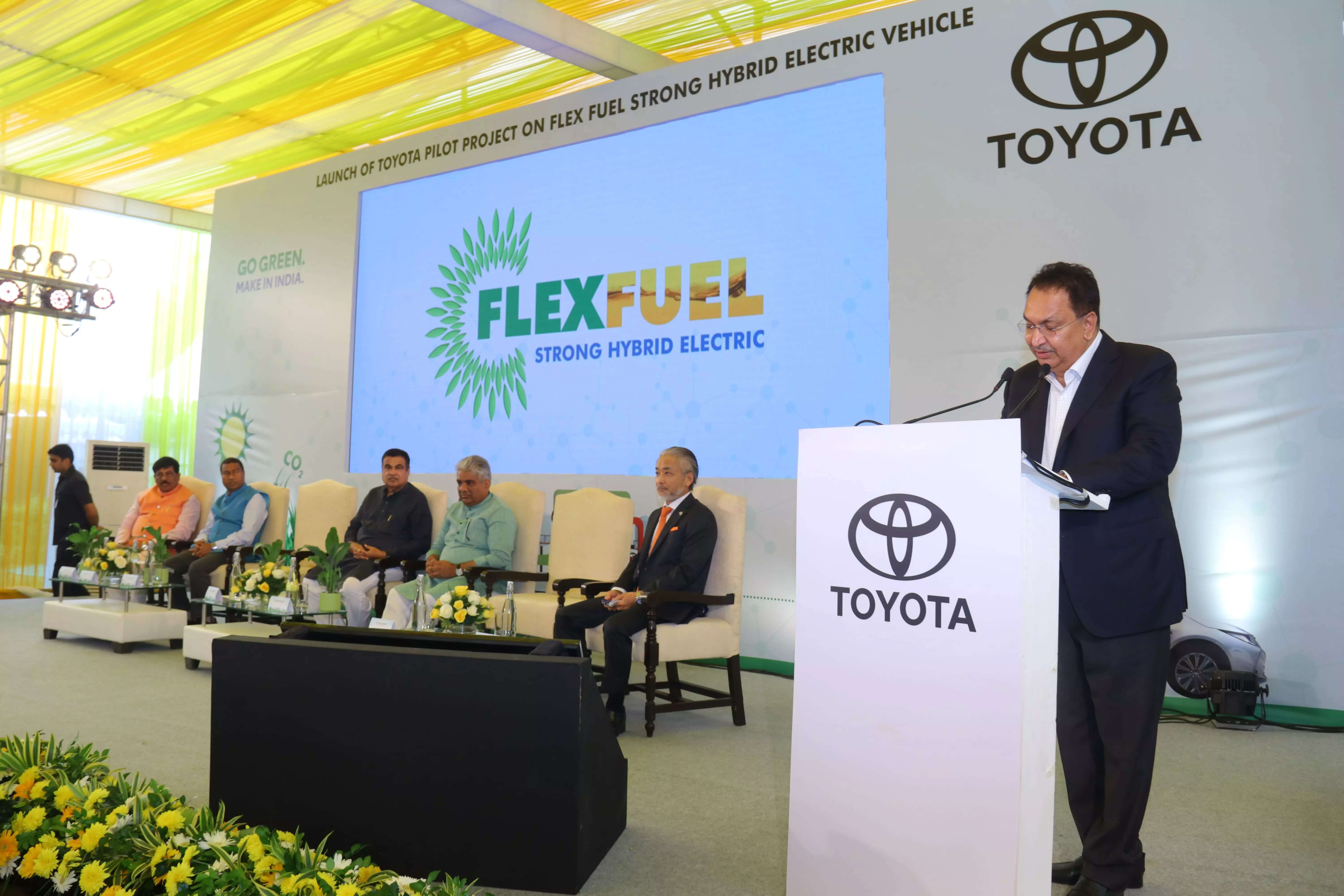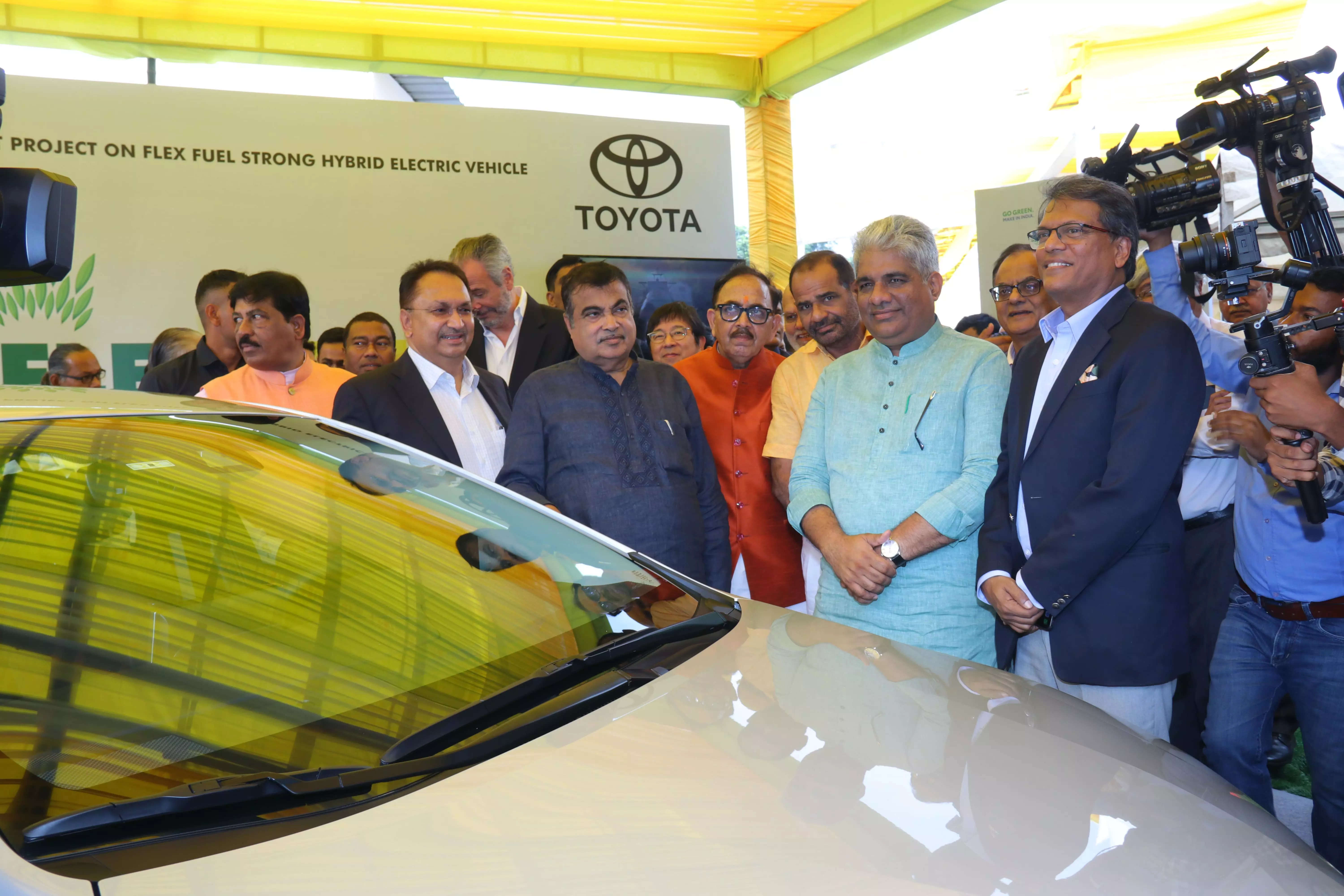
New Delhi: Toyota today launched a pilot project on Flexi-Fuel Strong Hybrid Electric Vehicle Technology in Delhi. The innovative Flexi fuel-strong Hybrid electric vehicle technology (FFV – SHEV) was introduced by Toyota Brazil which has the lowest Well-to-Wheel (W2W) carbon emissions for any technology available now.
A Toyota Corolla Altis FFV-SHEV, imported from Toyota Brazil for the pilot project, was unveiled at the event. As a part of this project, a Memorandum of Understanding was also signed between Toyota Kirloskar Motor (TKM) and the Indian Institute of Science (IISc), Bengaluru. Toyota will share collected data with IISc for conducting a deeper study about the well-to-wheel carbon emissions of FFV / FFV-SHEV in the Indian context, TKM said in a media release.
This initiative marks Toyota’s first step to promote and create awareness on Ethanol as an important indigenous, carbon neutral energy pathway, along with the advanced Strong Hybrid Electric Vehicle technology of Toyota that can help India achieve true self-reliance and contribute towards the national target of Carbon Net-Zero by 2070.
An FFV– SHEV has a Flexi Fuel engine and an electric powertrain, thus providing dual benefit of higher ethanol use and greater fuel efficiency, as it can run for long on its EV mode, wherein the engine is shut off. The FFV-SHEV has much higher economic multiplier benefits, as it can hasten local manufacturing of electric and flexi-fuel powertrain parts, thus providing a disruption-free and low risk industry and energy transition. As this technology provides the opportunity to benefit from both electrification and bio-fuel energy pathways, it enables a faster reduction of fossil fuel consumption, CO2 emissions, as well as boosting the agrarian economy, the release said.
Ethanol holds tremendous potential for India as it is an indigenous and clean energy source that can significantly reduce fossil fuel consumption, the energy import bill and carbon emissions. Being agriculture based, higher use of ethanol as fuel will also increase farmer incomes and create new jobs, thereby boosting the rural economy. It will also increase revenue for the Government from surplus sugar and food grains. The Government has recently launched second-generation technologies for producing ethanol from agricultural residues like parali, which is currently otherwise burnt. This possibility will not only prevent severe air pollution but also help generate wealth from waste, the release added.
India has already achieved 10% ethanol blending five months ahead of schedule. The implementation of 20% ethanol blending in petrol by 2025-26 is expected to substitute 86 million barrels of Gasoline, thereby leading to forex savings of INR 30,000 crore for India, as well as reducing 10 million tonnes of carbon emissions. Given the huge potential of ethanol production that exists up to and beyond E20, these benefits can increase multi-fold with the introduction of FFV technology that can flexibly use higher ethanol blends from 20% to 85%, the release said.
Toyota has developed all clean technologies and believes in introducing these based on each country’s unique requirements and context, so as to minimize fossil fuel usage and achieve carbon reduction in the fastest possible time. Towards this direction, given India’s energy mix, its unique consumer profile and needs, infrastructure readiness, and the Government’s diversified efforts towards becoming ‘Atma Nirbhar’ in energy by 2047, we are advancing solutions with greater agility, thereby introducing and supporting multiple clean technology pathways, the release said.
The launch event was attended by Nitin Jairam Gadkari, Union Minister of Road Transport and Highways, Mahendra Nath Pandey, Union Minister of Heavy Industries, Bhupinder Yadav, Union Minister of Environment, Forest, and Climate Change, and Rameswar Teli, Minister of State for Petroleum & Natural Gas – Government of Delhi, government dignitaries, industry leaders, academia and senior executives of Toyota Kirloskar Motor.
Read More:















